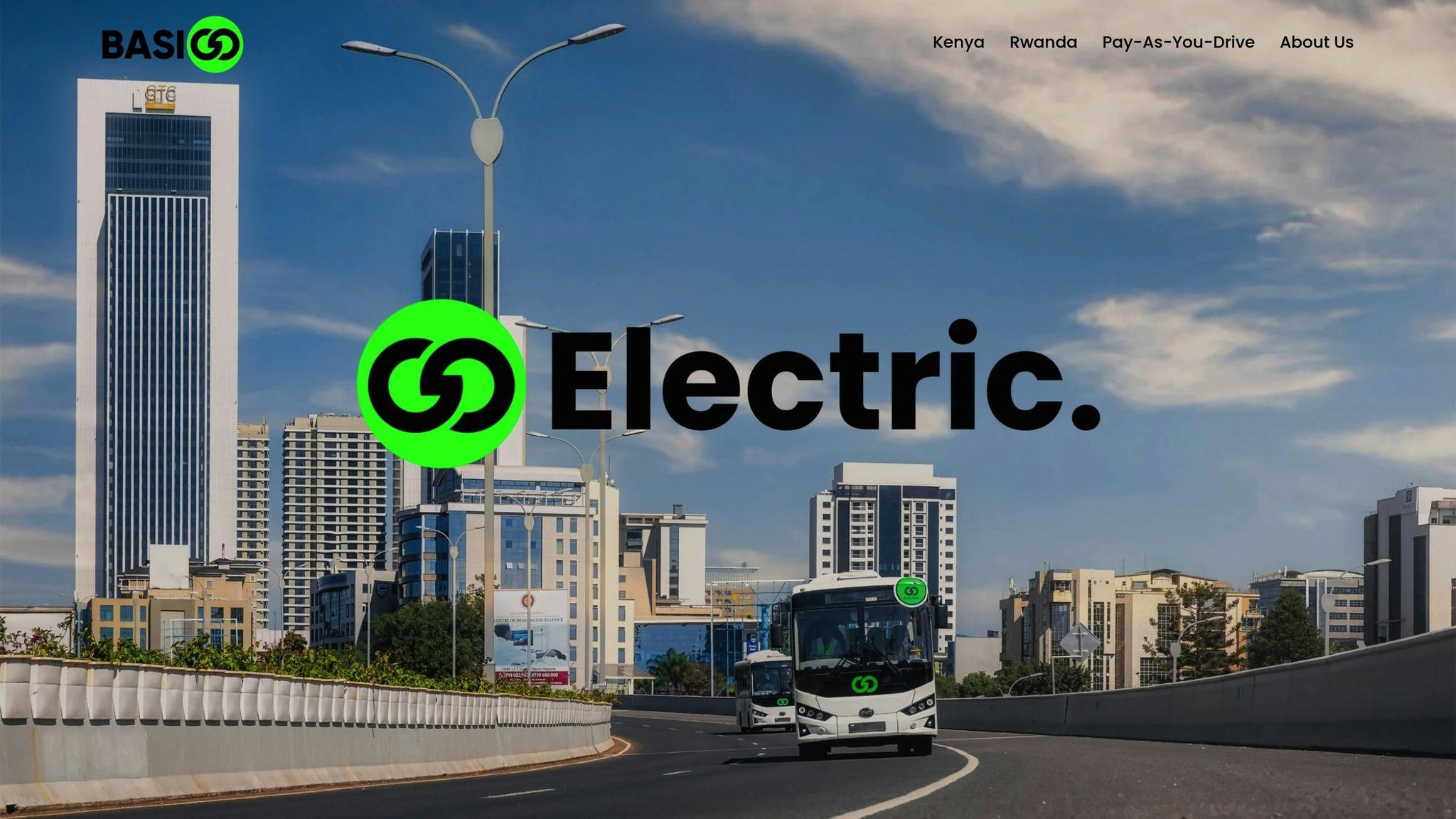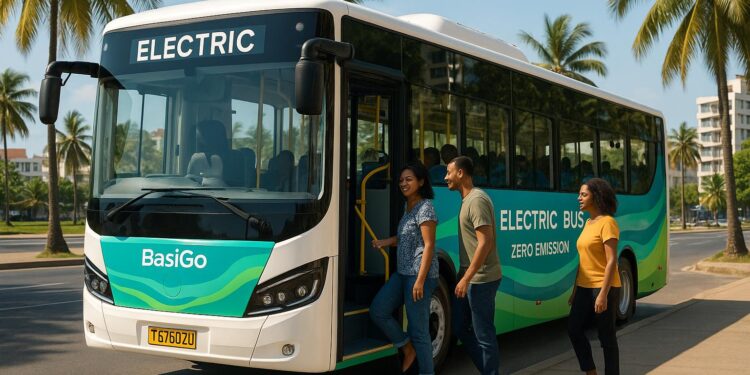BasiGo is introducing electric buses to Dar es Salaam, addressing urban transit challenges like traffic congestion, pollution, and unreliable service. Their Pay-As-You-Drive (PAYD) model reduces upfront costs for local operators, covering expenses like charging, maintenance, and insurance through mileage-based fees. These electric buses cut fuel costs, improve air quality, and offer a quieter, smoother ride for passengers.
Key highlights:
- PAYD Model: Operators pay based on usage, with minimal upfront investment.
- Charging Infrastructure: Strategically placed depots with fast-charging technology ensure buses stay operational.
- Economic Impact: Creates jobs in EV maintenance and infrastructure while reducing reliance on diesel fuel.
- Commuter Benefits: Cleaner air, quieter rides, and reliable service improve the transit experience.
This approach not only modernizes Dar es Salaam’s public transit but also supports broader efforts to reduce emissions and improve urban living.
Own A BasiGo Electric Bus By Paying As You Drive | How It Started

BasiGo’s Business Models and Financing
BasiGo has introduced a financing strategy designed to make electric buses more accessible for local operators who might otherwise face challenges with steep upfront costs. Many bus operators in Dar es Salaam operate with tight budgets, so BasiGo has developed flexible payment options to lower these financial barriers. At the heart of this strategy is their Pay-As-You-Drive (PAYD) model, which simplifies the transition to electric buses.
Pay-As-You-Drive Model
The PAYD model is key to making electric buses more affordable and practical. With this system, operators can obtain an electric bus with minimal upfront costs. They have the option to either lease the entire vehicle or purchase the bus without the battery and lease the battery separately.
Under this model, operators only pay fees when the bus is in use, ensuring expenses are predictable and tied to actual usage. The mileage-based fee covers a comprehensive range of services, including:
- Free charging at BasiGo depots
- Nightly cleaning and routine inspections
- Scheduled maintenance every 15,000 km (about 9,320 miles)
- Roadside assistance
- Vehicle insurance
- Bus monitoring
This setup removes the usual headaches of managing maintenance, insurance, and other operational tasks. BasiGo guarantees 90% uptime for its electric buses, ensuring reliable service for operators and passengers alike. On top of that, operators can recover their initial deposit in under 12 months, making the investment even more appealing.
In comparison, owning a diesel bus often requires a hefty down payment and long-term loans. Diesel operators also face fluctuating fuel costs and must handle maintenance, repairs, and fleet management on their own – challenges that the PAYD model is specifically designed to address.
This model not only eases the financial burden on operators but also supports the development of a cleaner, more accessible public transit system in Dar es Salaam.
Impact on Local Bus Operators
The PAYD model has significantly reduced financial and operational barriers for local bus operators. By lowering upfront costs, it allows smaller operators to adopt electric buses more easily [4].
This approach also promotes fleet upgrades by minimizing the risks tied to adopting new technology. With BasiGo taking care of maintenance, monitoring, and other technical responsibilities, operators can concentrate on their main job: transporting passengers. At the same time, they benefit from cleaner, more efficient vehicles.
Electric buses are also less expensive to operate compared to diesel alternatives, enabling operators to keep fares competitive while potentially boosting their profit margins. The predictable costs of the mileage-based fee system help operators manage their finances more effectively – an advantage particularly valuable for those with limited resources. These innovations not only modernize transit fleets but also align with Dar es Salaam’s efforts to promote cleaner and more sustainable urban transportation.
EV Charging Infrastructure in Dar es Salaam
For BasiGo’s electric bus strategy to thrive in Dar es Salaam, a dependable charging network is absolutely essential. The company is building strategically located charging hubs to ensure its growing fleet stays on the road. This infrastructure supports the PAYD model’s promise of keeping buses operational 90% of the time.
Current Charging Network
BasiGo has set up dedicated charging depots across Dar es Salaam to support its electric bus operations. These depots are strategically placed along key routes, minimizing the need for buses to deviate from their paths.
Equipped with DC fast-charging technology, these depots allow buses to recharge quickly during route breaks. This capability is crucial for meeting the high uptime rates BasiGo promises. To avoid congestion during busy periods, each depot has multiple charging points, allowing several buses to charge simultaneously.
The current network emphasizes overnight charging at central depots. This setup enables buses to fully recharge during off-peak hours when electricity costs are typically lower. By doing so, BasiGo manages to keep operational costs in check while ensuring that buses are ready with full batteries each morning. Backup power systems have also been installed at key depots to ensure uninterrupted charging during power outages.
Additionally, the infrastructure includes smart monitoring systems that track energy usage, charging speeds, and battery health. This data allows BasiGo to fine-tune charging schedules and address potential issues before they disrupt operations. Operators can also monitor their vehicles’ charging status in real-time through BasiGo’s platform.
With this foundational network in place, BasiGo is now focused on scaling its infrastructure to accommodate its growing fleet.
Expanding Charging Infrastructure
To support a larger fleet, BasiGo is ramping up its charging network. Plans include installing opportunity charging stations along major routes. These stations will allow drivers to top up their batteries during scheduled breaks, extending the daily range of the buses and enabling longer routes.
BasiGo is collaborating with local businesses and utilities to place these opportunity charging stations in high-traffic areas. Additionally, mobile charging units will be deployed to serve routes that are still waiting for permanent depots.
The integration of solar power at depots is another key initiative. Solar panels will generate clean energy during the day, which can then be stored in batteries and used during peak charging hours. This not only reduces charging costs but also aligns with sustainability goals.
To ensure the grid can handle the increased demand from electric buses, BasiGo is working closely with Tanzania’s electricity utility. This includes upgrading electrical connections at charging sites and implementing load management systems to distribute charging across different times, preventing grid overload.
BasiGo’s infrastructure expansion is designed to stay ahead of fleet growth. By proactively increasing charging capacity, the company ensures that new buses can be seamlessly integrated into the network. This forward-thinking approach supports reliable service for operators while encouraging the broader adoption of electric buses in Dar es Salaam’s public transit system.
sbb-itb-d9186c2
Costs and Economic Benefits
BasiGo’s move to electric buses doesn’t just cut down on fuel costs – it also brings financial and operational advantages that can reshape daily transit operations and pave the way for long-term growth.
Cost Comparison: EV vs. Diesel Buses
At first glance, electric buses come with a higher price tag compared to diesel models. But here’s the catch: their ongoing expenses are significantly lower. Diesel buses are at the mercy of fluctuating fuel prices, while electric buses enjoy more stable and lower energy costs. Plus, electric motors are simpler machines with fewer moving parts, meaning maintenance is less frequent and less expensive than with diesel engines.
BasiGo’s innovative "Pay-As-You-Drive" model flips the script on upfront costs. Instead of operators needing to make a massive initial investment, this system breaks down expenses into manageable daily payments. These payments cover everything from the vehicle itself to routine upkeep and support services. This approach makes electric buses a realistic option for operators who might otherwise struggle with the financial barrier.
On top of that, electric buses bring operational efficiencies. Training drivers is quicker and less costly, thanks to the streamlined systems of electric vehicles. All these savings create a ripple effect, setting the stage for broader economic gains.
Economic Opportunities
The benefits of transitioning to electric buses go far beyond saving money. In Dar es Salaam, this shift is opening up new economic possibilities. As BasiGo expands its operations, it’s creating jobs across a spectrum of roles, from technical maintenance and repair to infrastructure development and support services. Local technicians are being trained to specialize in electric vehicle upkeep, and partnerships with technical colleges in the city are helping to build a skilled workforce ready to meet the demands of this growing industry.
The expansion of charging infrastructure is another bright spot. Local contractors are gaining expertise in high-voltage systems and fast-charging technology, while supply chains are finding fresh opportunities in producing components and accessories specific to electric buses.
These economic benefits also ripple into the social sphere. Electric buses, with their quieter and cleaner operation, are making the driving profession more appealing, especially to women entrepreneurs. This shift is helping to create a more inclusive transportation sector. Meanwhile, as the fleet of electric buses grows, it’s sparking investments in renewable energy, like solar panels at bus depots, which align with the nation’s clean energy goals.
The positive effects don’t stop there. Cleaner air and reduced noise pollution enhance urban living, making the city more attractive for tourism and business. Financial institutions are also stepping in, developing new financing products tailored to support the electric vehicle ecosystem.
All these factors are working together to help Dar es Salaam build a transit network that’s not only more efficient but also more sustainable and inclusive.
Climate and Urban Mobility Benefits
BasiGo’s electric buses are reshaping daily life in Dar es Salaam by cutting pollution and improving the commuting experience.
Reducing CO₂ Emissions and Diesel Dependency
BasiGo’s electric buses produce zero direct emissions, significantly lowering the amount of harmful pollutants in Dar es Salaam’s crowded streets. In contrast, a single diesel bus releases tons of CO₂ and harmful particulates each year. Switching to electric buses dramatically reduces the city’s overall carbon footprint.
This shift aligns perfectly with Tanzania’s push for cleaner energy solutions. As the country strives to meet its environmental goals, electric buses offer a visible, practical step forward. Plus, using less diesel means reducing reliance on imported fossil fuels, which not only benefits the environment but also strengthens the local economy.
What’s unique about these buses is how they deliver their environmental benefits silently. They don’t force a trade-off between cleaner air and performance – these vehicles provide both. The result? A win for the environment and a better experience for passengers.
A Better Ride for Commuters
Beyond cleaner air, commuters are now enjoying a much quieter and smoother ride. Electric buses eliminate the constant noise and vibrations of diesel engines, creating a more peaceful environment. The quiet operation is one of the first things passengers notice, making the journey far more pleasant.
This quieter ride isn’t just about comfort – it’s practical too. Passengers can chat without shouting, use their phones more easily, and arrive at their destinations feeling less drained from noise exposure. For students and professionals with long commutes, this improvement can make their daily routines noticeably better.
Additionally, the modern design of these buses includes amenities that elevate the travel experience. Improved ventilation systems maintain comfortable temperatures, while the smooth acceleration and braking of electric motors reduce the jarring stops common with older diesel buses. These features combine to make each ride more enjoyable and less stressful.
Reliability is another major advantage. Electric buses have fewer mechanical parts that can fail, meaning they spend less time in repair shops. This leads to more consistent service, fewer delays, and a more dependable public transportation system.
These upgrades are making public transit more appealing to a wider audience, including those who might have previously opted for private cars or motorcycle taxis. By improving comfort, reliability, and overall experience, electric buses are helping to transform how residents view and use public transportation in Dar es Salaam.
The Future of EV Buses in Tanzania
With its strides in modernizing transit and addressing air quality concerns, BasiGo is paving the way for the future of electric buses in Tanzania. By introducing electric buses in Dar es Salaam, the company not only upgrades the city’s transportation system but also sets an example for other cities grappling with aging diesel fleets and pollution challenges. This approach underscores the potential for a broader transition to cleaner transportation across the country.
As renewable energy capacity grows, the sustainability of electric buses will only improve, making them an even more viable alternative to traditional diesel options.
Beyond transforming how people move, the shift to electric buses is sparking opportunities for workforce development and green investments. Local technicians can gain expertise in electric vehicle maintenance, while the expansion of charging infrastructure creates new business opportunities within the green economy.
Government initiatives aimed at reducing carbon emissions are expected to further accelerate the adoption of cleaner transit solutions. The success seen in Dar es Salaam highlights how integrating electric buses into public transportation systems can play a key role in sustainable urban development, aligning with Tanzania’s broader goals for eco-friendly transit.
BasiGo’s efforts are drawing attention from regional stakeholders as a potential blueprint for modernizing public transportation. Electric buses not only reduce environmental impact but also provide quieter, smoother, and more comfortable rides, enhancing the daily commute experience for passengers.
FAQs
How does BasiGo’s Pay-As-You-Drive model help local operators in Dar es Salaam afford electric buses?
BasiGo’s Pay-As-You-Drive model offers a practical solution for local operators in Dar es Salaam looking to adopt electric buses without the burden of hefty upfront costs. Rather than purchasing the buses outright, operators pay a usage-based fee that takes care of essentials like charging and maintenance.
This approach reduces financial hurdles, making the shift to electric buses more accessible. By using this model, operators can manage their expenses while supporting a cleaner, more environmentally friendly public transportation system in Tanzania.
What are the environmental and economic advantages of switching to electric buses in Dar es Salaam instead of using diesel buses?
Switching to electric buses in Dar es Salaam offers huge environmental advantages, notably slashing CO2 emissions by up to 92% compared to diesel buses. This shift not only improves air quality but also plays a role in addressing climate change, contributing to a healthier and more livable city for its residents.
From an economic perspective, the benefits are equally compelling. Electric buses can save millions of dollars each year by eliminating the need for costly diesel fuel. Plus, with fewer moving parts, maintenance costs are significantly lower, making them a more budget-friendly option over time. On top of that, the transition to electric buses can stimulate the local economy by creating jobs in areas like building charging infrastructure and maintaining the new fleet.
What is BasiGo doing to ensure there’s enough charging infrastructure for its electric buses in Dar es Salaam?
BasiGo is making strides to expand the charging network for its electric buses in Dar es Salaam. The company utilizes existing public Level 2 charging stations operated by TANESCO, as well as facilities managed by private organizations. Currently, there are around 15 charging stations available in the area. To accommodate increasing demand, plans are in place to add more stations every 30–75 miles along key routes, supported by government-backed initiatives and policies.
These measures aim to provide dependable charging options, ease concerns about vehicle range, and promote the shift to environmentally friendly public transit, helping to make urban travel in Dar es Salaam more efficient and sustainable.
Related Blog Posts
- Tanzania’s EV Adoption: Key Challenges
- Kenya’s EV charging infrastructure sets a model for Tanzania
- Kiira Motors of Uganda may expand solar e-bus model to Tanzania
- Tanzania still lagging behind in EV charging station rollout




